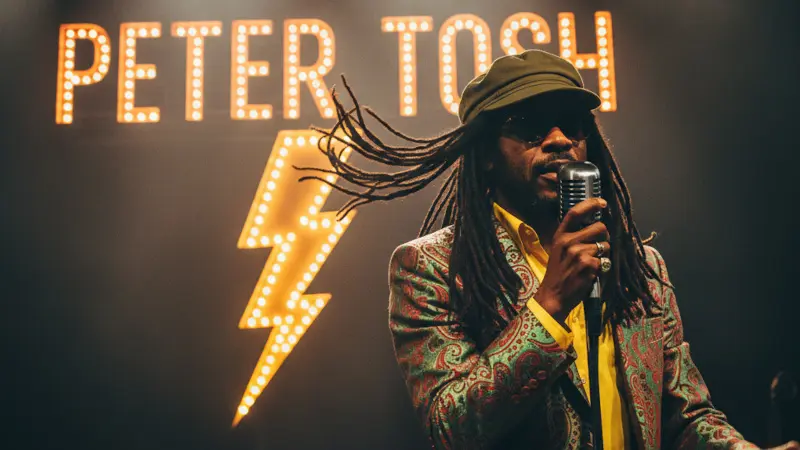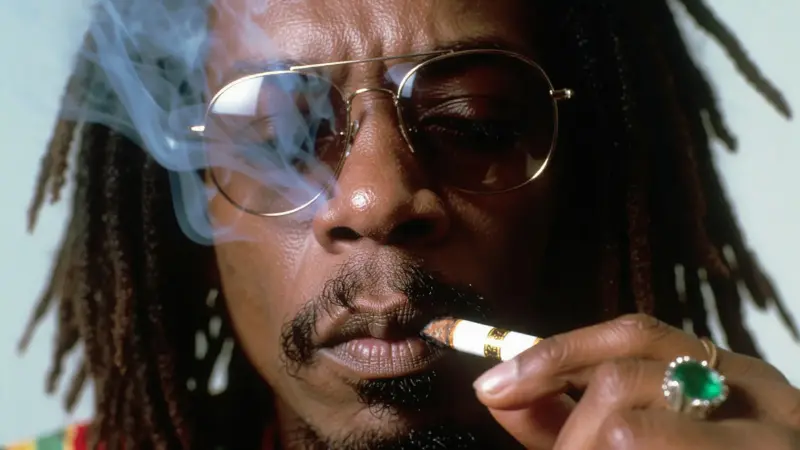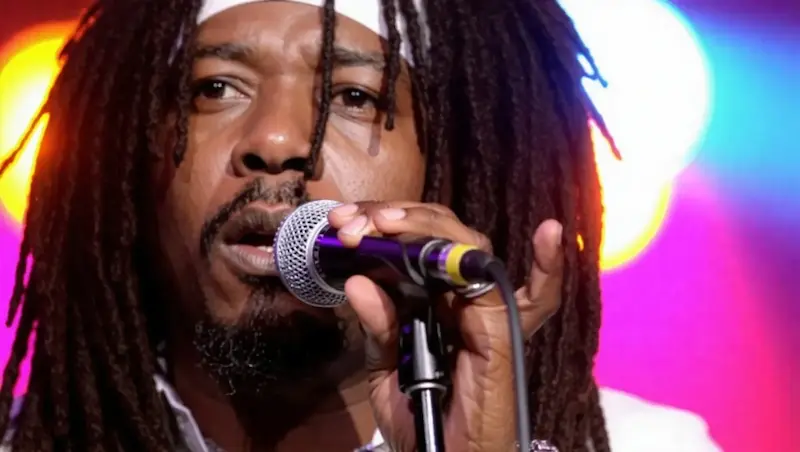
Introduction
Peter Tosh, known as The Stepping Razor of reggae, wasn’t just another star. He was an uncompromising rebel.
While Bob Marley carried the flag of unity, Tosh wielded the sword of justice. A roots reggae pioneer, activist, and passionate lyricist, he turned songs like Legalize It and Equal Rights into protest anthems that still resonate today.
He is one of the most significant yet misunderstood figures in reggae history. His story is as much about rebellion as it is about music.
Tosh didn’t soften his message for anyone. He sang what he believed, regardless of the costs to his record sales, radio play, or personal safety. He used every stage and microphone as a platform for Rastafari truth, justice, and freedom. He was as much an activist as he was a musician.
Who was Peter Tosh: The Stepping Razor?
Peter Tosh, known as The Stepping Razor, was a Jamaican reggae pioneer, activist, and founding member of The Wailers. He gained fame for songs like Legalize It and Equal Rights, but more importantly, for his fearless political stance.
Tosh embodied the rebellious spirit of roots reggae. He supported the legalization of cannabis and spoke out against apartheid. His nickname, “Stepping Razor,” reflected his sharp, fierce demeanor—someone who could use words like a sword to cut through hypocrisy.

Early Life: From Rural Roots to Kingston Streets
Winston Hubert McIntosh, later known as Peter Tosh, was born in 1944 in Westmoreland, a rural parish on Jamaica’s western edge. He had a difficult childhood, raised by relatives after his mother moved to Kingston.
Tosh grew up in a world where music was more than entertainment. It was a means of survival, a spiritual outlet, and a cultural memory.
As a child, Tosh taught himself to play the guitar by watching street performers and copying their movements. He later learned to play the melodica, a small keyboard that became a key part of his music. People who knew him as a young boy often said he had a restless, confrontational spirit. While others followed, Tosh questioned. While others accepted, he resisted. This attitude defined his entire career.
In the early 1960s, like many young Jamaicans, Tosh moved to Kingston, settling in Trench Town. The capital was alive with ska, rocksteady, and sound systems, but it was also a place of poverty and political gang violence. It was here that fate would connect Tosh with two other dreamers: Robert Nesta Marley and Neville Livingston, known as Bunny Wailer.
The Wailers: Peter Tosh and Reggae’s First Vanguard
The story of The Wailers is often told as Marley’s rise to fame. But anyone who listens closely to their early recordings can hear Tosh’s influence just as strongly. He wasn’t just a background musician; he was the group’s counterbalance, a militant voice alongside Marley’s spiritual uplift and Bunny’s soulful harmonies.
When the trio started working with producer Coxsone Dodd at Studio One, they recorded tracks like Simmer Down (1964), a ska hit that resonated with Kingston’s restless youth. Tosh’s deep voice added roughness to the group’s sound, and his songwriting quickly became just as important.
Take Get Up, Stand Up (1973), co-written by Marley and Tosh. Tosh played a major role in the song’s aggressive, confrontational edge, which has made it one of reggae’s most widely recognized anthems. “Preacherman don’t tell me / Heaven is under the earth,” he growled in live performances, rejecting complacency and urging listeners to take action.
Tosh wasn’t afraid to provoke; he thrived on it. Within The Wailers, he often pushed hardest against industry compromises, and his commitment to radical honesty eventually put him at odds with management and bandmates.
Peter Tosh: The Stepping Razor Breaks Away
By 1974, tensions within The Wailers reached a boiling point. Tosh, never one to hold back, was frustrated with the group’s direction and Marley’s growing presence in the spotlight. More importantly, he wanted complete freedom—the freedom to sing about colonialism, apartheid, and cannabis legalization without limits.
Leaving The Wailers wasn’t just a career decision; it was an act of rebellion. Tosh aimed to carve his own path and use music to convey his unwavering philosophy.
He took on the persona of The Stepping Razor—a nickname first given by Jamaican singer Joe Higgs, later immortalized in Tosh’s fiery song of the same name. The title symbolized defiance, danger, and edge. Tosh was the razor behind reggae’s velvet glove, the voice that cut through empty rhetoric with brutal honesty.
Legalize It: Music as Defiance
In 1976, Tosh released his debut solo album, Legalize It. The title track remains one of reggae’s most recognizable protest songs, a bold anthem calling for the legalization of marijuana.
“Legalize it / And I will advertise it.”
Those lines were more than catchy. In Jamaica, cannabis (or ganja) was—and still is—linked to Rastafari beliefs, used in spiritual practices and viewed as a sacred substance. However, possession was illegal, and the police often used anti-ganja laws to harass Rastafari communities. By advocating for legalization, Tosh was challenging systemic oppression, not just talking about a plant.
The Jamaican government prohibited promotion of the album, which only enhanced its underground impact. In many ways, Legalize It established Tosh as reggae’s most outspoken dissident—a man willing to speak out when Marley, with his broader ambitions, often softened his message.
Equal Rights: A Global Manifesto
If Legalize It established Tosh as a solo force, Equal Rights (1977) solidified his role as reggae’s militant prophet. The album was direct. Tracks like Downpressor Man reinterpreted the Christian hymn Sinner Man, transforming it into a fierce critique of oppressors. The title track, Equal Rights, stated plainly:
“Everyone is crying out for peace, yes / None is crying out for justice.”
At a time when apartheid in South Africa was rampant and post-colonial nations faced inequality, Tosh’s words resonated with activists worldwide. Unlike Marley’s calls for unity, Tosh demanded confrontation. He named names, pointed fingers, and insisted that peace without justice was meaningless.
It was more than music—it was a manifesto. It made him both admired and feared.

Collaborations and Crossovers
Tosh recognized the importance of reaching larger audiences. In 1978, he worked with The Rolling Stones to record a cover of The Temptations’ Don’t Look Back. This collaboration exposed him to rock fans around the globe, earning radio play beyond reggae’s usual audience.
But even in crossover moments, Tosh kept his edge. At the renowned One Love Peace Concert in Kingston in 1978, he openly criticized Jamaica’s political leaders—Prime Minister Michael Manley and opposition leader Edward Seaga—for their hypocrisy, corruption, and failure to reform cannabis laws. In front of an audience that included Bob Marley and international media, Tosh lit a spliff, daring the police to arrest him.
That bold act would have serious consequences; shortly after, he was brutally beaten by Jamaican police. Yet, instead of silencing him, the violence only reinforced his image as reggae’s uncompromising rebel.
Lyrical Style: The Razor’s Edge
Tosh’s lyrics were not meant to comfort; they aimed to provoke. He wrote reggae protest songs that struck hard—sharp, direct, and unyielding.
- Stepping Razor—a statement of self-identity, warning foes that he was not to be underestimated.
- Equal Rights—a clear demand for justice over empty calls for peace.
- Apartheid—a song so straightforward that it became an anthem in South Africa’s resistance movement.
While Marley often used parables and metaphors, Tosh favored clarity. His Rastafari philosophy was infused with a fiery conviction. If the system was unjust, he called it out without hesitation.
Musically, Tosh embraced heavier basslines and darker sounds than Marley. His use of the melodica added an eerie, haunting quality to his tracks. He blended reggae with rock or funk elements, giving his sound a harder edge that attracted rebellious listeners across genres.

Comparison with Marley: The Dove and The Razor
It’s easy to draw comparisons between Peter Tosh and Bob Marley, as they emerged together and addressed similar themes. However, they served different roles in the evolution of reggae.
Marley was the dove—a bridge-builder, a global ambassador whose charm softened radical ideas into widely appealing songs. Tosh was the razor—sharp, uncompromising, and unwilling to dilute his message for commercial gain.
Both were essential. Without Marley, reggae may never have reached the world stage. Without Tosh, its rebellious core might have faded. Together, they shaped reggae’s dual legacy of love and defiance.
The Violent End
Sadly, Peter Tosh’s life ended abruptly in 1987. He was murdered in his home during a robbery, a cruel twist for a man who spent his life confronting violence and injustice. He was only 42 years old.
His death rocked the reggae community, but it also cemented his legend. In the years that followed, Tosh became recognized not just as a musician but as a bold activist who never compromised his beliefs.

Legacy: A Rebel’s Influence
More than three decades later, Peter Tosh’s impact continues to resonate in music and activism. His songs are still performed at protests, his image still appears on murals, and his words still echo in political speeches.
- Reggae Artists: Contemporary conscious reggae musicians like Damian Marley, Chronixx, and Protoje carry Tosh’s rebellious spirit into new generations.
- Punk and Rock: Bands like The Clash admired Tosh’s fierce stance, blending reggae rhythms and political lyrics into their music.
- Hip-Hop: Many rappers see Tosh as an inspiration for his willingness to speak uncomfortable truths through art.
Above all, Tosh remains a symbol of resistance—a testament to the idea that music can serve as both entertainment and a tool against injustice.
FAQs about Peter Tosh: The Stepping Razor
Why was Peter Tosh called The Stepping Razor?
The nickname came from a song written by Joe Higgs. Tosh embraced it as a representation of his sharp, dangerous personality—someone who would cut through lies and oppression without hesitation.
Why did Peter Tosh leave The Wailers?
Tosh left in 1974 due to dissatisfaction with creative control and Marley’s growing dominance. He wanted to pursue a more radical, uncompromising message in his solo career.
What are Peter Tosh’s most famous songs?
His best-known tracks include Legalize It, Equal Rights, Stepping Razor, and Apartheid. Each remains an important reggae protest anthem.
What is the meaning of Stepping Razor?
In Jamaican slang, a “stepping razor” refers to someone sharp, dangerous, and not to be underestimated. Tosh embodied this spirit in both his life and his music.
How did Peter Tosh die?
He was tragically murdered during a home invasion in 1987 in Kingston, Jamaica.
What made Peter Tosh different from Bob Marley?
While Marley often used metaphor and spiritual imagery, Tosh was straightforward and confrontational. He prioritized justice over diplomacy, making him reggae’s militant voice.
Conclusion
Peter Tosh: The Stepping Razor was more than a reggae musician. He was a prophet of rebellion, a voice for the voiceless, and a man who refused to bow to authority. His legacy isn’t measured only in records sold or concerts performed—it lies in the movements he inspired, the governments he challenged, and the truths he brought to light.
Marley may have been reggae’s dove, but Tosh was its razor. Sometimes, to cut through oppression, you need a blade.





